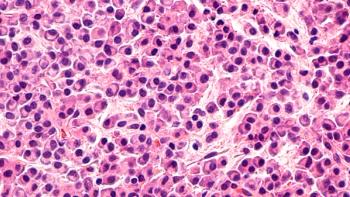
The FDA accepted an investigational new drug application providing clearance to begin an open-label, single-arm phase 1 clinical trial of ATA2271, a next-generation mesothelin targeting CAR T-cell therapy.

Your AI-Trained Oncology Knowledge Connection!


The FDA accepted an investigational new drug application providing clearance to begin an open-label, single-arm phase 1 clinical trial of ATA2271, a next-generation mesothelin targeting CAR T-cell therapy.

The cancer specialist from Cedars-Sinai spoke about the observed increase of colorectal cancer in younger individuals, as well as the significantly higher incidence and death rates in black people.

Researchers indicated that these early data support the rationale for further evaluation of immune-checkpoint inhibitor-based combinations in patients with metastatic castration resistant prostate cancer.

In this study, antibiotic use was consistently associated with worse survival outcomes in patients with urothelial carcinoma treated with atezolizumab, but not chemotherapy.

According to researchers, these “results suggest that both schedules of decitabine are safe and effective in the population assessed.”

The collective study findings suggested that for risk assessment, the recurrence score needs to be complemented by clinicopathologic parameters for therapy decision making.

These study results “provide insight into the natural history of [retroperitoneal sarcoma] beyond the first and second surgeries for [local recurrences].”

Researchers found that in patients receiving immunotherapy for metastatic renal cell carcinoma, higher microbial diversity was associated with better treatment outcomes.

New guidelines published by the American Society for Clinical Oncology (ASCO) on the use of PARP inhibitors in the management of ovarian cancer included the myChoice CDx as the sole companion diagnostic to be used in this space.

This study found black patients were less likely to undergo chemotherapy or surgical resection for colorectal liver metastases and had worse survival compared to other patients.

The supplemental biologics license application is seeking approval for the treatment of patients with light chain amyloidosis and is supported by results observed in the phase 3 ADROMEDA study.

This study found focal high intensity focused ultrasound ablation of the prostate to be safe and provide excellent potency, continence preservation, and adequate short-term prostate cancer control.

Capmatinib (Tabrecta) demonstrated substantial antitumor activity in patients with advanced non-small cell lung cancer with a MET exon 14 skipping mutation, especially in those not treated previously.

Researchers suggested these findings support “continued access to opioid medications for cancer survivors who may benefit from such therapy.”

The study is evaluating the addition of ixazomib (Ninlaro) to lenalidomide and dexamethasone versus lenalidomide and dexamethasone plus placebo in patients with newly diagnosed multiple myeloma who are ineligible for autologous stem cell transplant.

A clinically meaningful 40% overall response rate was seen in a subset of patients with triple class refractory multiple myeloma who received CLR 131 at a total administered dose of 60 mCi or greater.

The agency indicated that the use of atezolizumab (Tecentriq) and paclitaxel in patients with previously untreated, inoperable, locally advanced, or metastatic triple negative breast cancer was not effective in treating the disease.

The Detectnet injection was approved by the FDA for the localization of somatostatin receptor positive neuroendocrine tumors in adult patients.

However, researchers did identify a positive correlation for the risk of some cancers in this prospective cohort study.

The approval was based on results from the phase 1/2 ARROW clinical trial, which demonstrated efficacy for pralsetinib in patients with RET fusion-positive NSCLC with or without prior therapy, and regardless of RET fusion partner or central nervous system involvement.

In this study, geriatric co-management was associated with significantly lower 90-day postoperative mortality compared to patients who received care managed by surgery service only.

Researchers indicated the risk for those presenting to primary care physicians is 2% or less and does not warrant further investigation under current UK guidelines.

Researchers indicated that these findings highlight the need for clinicians to emphasize the importance of both smoking cessation and cancer screening for women who currently smoke.

The researchers indicated that the integrated, standardized management of testicular cancer may help overcome sociodemographic factors often associated with adverse clinical outcomes.

This study is the first to show anti-GPIIbIIIa and anti-GPIbIX in the bone marrow of patients with immune thrombocytopenia.

The authors suggested that the “results of the current study have provided valuable insight into chronic medication adherence and health care use in a low-income population of patients with and without cancer.”

The study findings suggested that lower quality-of-care scores could decrease hospital payments, which could possibly increase health disparities for at-risk patients with cancer.

The liquid biopsy test is approved to identify patients who may benefit from treatment with specific FDA-approved targeted therapies.

The combination immunotherapy was associated with significant positive outcomes among patients with gallbladder carcinoma and intrahepatic cholangiocarcinoma.

Researchers suggested that this 6-week window may represent a critical time point at which decisions could be made regarding treatment escalation for this patient population.